Costa Rica is taking big strides towards revolutionizing ecotourism and is developing ambitious plans to become the world’s greenest nation. Additionally, they are devoted to promoting free education as well as healthcare and are hoping to set the bar on social and mainly environmental issues that plague the world today. Of course, they aren’t quite there yet and there are still quite a few challenges to overcome before Costa Rica can claim these wonderful titles. If you are looking for a way to help the happiest nation on its way or perhaps want to contribute to a worthy cause during your travels, then we have 10 initiatives to introduce to you that can benefit from your support.
Environmental Education: Community Engagement
What is the best way to create environmental awareness and how can our efforts be sustainable? Quite simple. Through education and participation. Fundraisers and media exposure are all good and well, but environmental health will always be something of a vague concept until it is introduced to our everyday lives.
These organizations bring environmental education to the local communities and make sure that adults and children alike can learn how to have a strong and positive impact on the world around them.
Corcovado Foundation
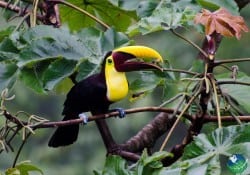
 Corcovado Foundation describes its mission as “Fighting to protect Costa Rica´s natural heritage for future generations by uplifting communities through education and engagement.”
Corcovado Foundation describes its mission as “Fighting to protect Costa Rica´s natural heritage for future generations by uplifting communities through education and engagement.”
This foundation tops the list not just because of its educational efforts, but also because of the variety of its programs. Located in the fabled Osa Peninsula, the Corcovado Foundation has an abundance of biodiversity to protect. Costa Rica holds within it 5% of the world’s biodiversity and little Osa takes up a whopping 2.5% of that while only occupying 0.00000085% of the earth’s surface. You can make various contributions to the Corcovado Foundation from adopting a sea turtle and volunteering as an environmental teacher or for the climate change program. Take your pick!
Del Mar Academy Foundation: Guardians of Nature

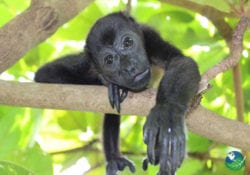 Continuing to nourish environmental awareness at its roots, this academy located in Nosara has a special program focused on environmental themes. Different subjects are introduced each year and range from planting trees to water and energy conservation, biodiversity and recycling, you are what you eat and revealing the keys to sustainable living.
Continuing to nourish environmental awareness at its roots, this academy located in Nosara has a special program focused on environmental themes. Different subjects are introduced each year and range from planting trees to water and energy conservation, biodiversity and recycling, you are what you eat and revealing the keys to sustainable living.
Additionally, these future Guardians of Nature participate in the Blue Flag program, celebrate World Environmental Day, take field trips, perform community service, launch campaigns and recycling programs and help develop a permaculture garden.
You are free to visit the school which also accepts donations for books and developing a recycling and compost station.
Classic Education
While environmental education is a worthwhile pursuit in every way, for some communities even a classic education is hard to come by. Costa Rica has several initiatives in place that focus on strengthening the education in the rural and impoverished areas of the country.
Lifting hands
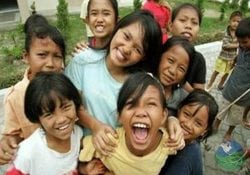
 One such initiative is Lifting Hands. Lifting Hands proactively visits communities that lack educational as well as recreational opportunities and works on programs to support academic performance in local children. This is mainly achieved by after school programs, offering a deeper level of education and making sure the community is a safe and fun area for children to play.
One such initiative is Lifting Hands. Lifting Hands proactively visits communities that lack educational as well as recreational opportunities and works on programs to support academic performance in local children. This is mainly achieved by after school programs, offering a deeper level of education and making sure the community is a safe and fun area for children to play.
Next to working to secure the future of children, Lifting Hands also funds the development of adults with a lower education level in order to increase their employment opportunities. This includes IT classes as well as English training programs. Donation of money as well as school supplies are accepted!
FQT: Fundacion Quiros Tanzi

 Technology has become indispensable when it comes to a well-rounded education. This is why FQT has made it its mission to close the technological gap in rural areas by providing students with laptops and launching education programs involving information technology. In this mission to promote technological literacy, FQT accepts monetary donations, the donation of items listed on the website or indeed the donation of your time. Note that if you want to volunteer, intermediate Spanish is required!
Technology has become indispensable when it comes to a well-rounded education. This is why FQT has made it its mission to close the technological gap in rural areas by providing students with laptops and launching education programs involving information technology. In this mission to promote technological literacy, FQT accepts monetary donations, the donation of items listed on the website or indeed the donation of your time. Note that if you want to volunteer, intermediate Spanish is required!
Animal Welfare
The list of animal welfare organizations in Costa Rica is endless! The pride this country takes in its biodiversity has brought forth many different initiatives that protect endangered species as well as man’s best friend. Here is our top 4!
Kids Saving the Rainforest
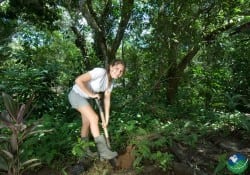
 KSTR is an NGO located in Manuel Antonio and founded in 1999 by two 9 year-olds with big dreams. Their main mission is to insure the reforestation of depleted regions of the country and also to rescue, rehabilitate and release wildlife. You can contribute by visiting the center and volunteering, donating money, or even by bringing items as mentioned on the wish-list that gets updated every year. If you want, you can also adopt a sloth like we did! We are sponsoring little Chicles, a two-toed sloth who was found clinging to his dead mother. He is only one of many baby sloths in need of help. Find out how you can contribute!
KSTR is an NGO located in Manuel Antonio and founded in 1999 by two 9 year-olds with big dreams. Their main mission is to insure the reforestation of depleted regions of the country and also to rescue, rehabilitate and release wildlife. You can contribute by visiting the center and volunteering, donating money, or even by bringing items as mentioned on the wish-list that gets updated every year. If you want, you can also adopt a sloth like we did! We are sponsoring little Chicles, a two-toed sloth who was found clinging to his dead mother. He is only one of many baby sloths in need of help. Find out how you can contribute!
Jaguar Rescue Center
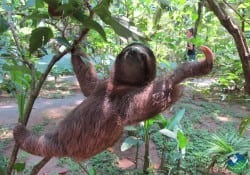
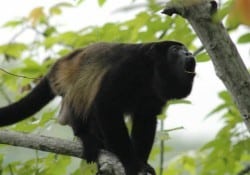 The Jaguar Rescue Center, located just outside of Puerto Viejo de Talamanca in the Province of Limon, is devoted to rehabilitating injured, orphaned, confiscated or mistreated wildlife. You can support the center simply by donating, adopting an animal, bringing or sending much needed supplies or by volunteering. Visiting is permitted but only during certain hours of the day in order to protect the animals from too many disruptive stimuli.
The Jaguar Rescue Center, located just outside of Puerto Viejo de Talamanca in the Province of Limon, is devoted to rehabilitating injured, orphaned, confiscated or mistreated wildlife. You can support the center simply by donating, adopting an animal, bringing or sending much needed supplies or by volunteering. Visiting is permitted but only during certain hours of the day in order to protect the animals from too many disruptive stimuli.
La Tortuga Feliz

 The Happy Turtle is located in the rough yet stunning Tortuguero north of Puerto Viejo and is devoted to the conservation of sea turtles. This project would mainly be of particular interest to those who crave real hands-on experience and aren’t afraid of hard work. You can get involved in the day to day activities of running the center as well as take part in the essential task of patrolling the nesting and hatching areas to protect the turtles from poachers. Read more about this wonderful initiative!
The Happy Turtle is located in the rough yet stunning Tortuguero north of Puerto Viejo and is devoted to the conservation of sea turtles. This project would mainly be of particular interest to those who crave real hands-on experience and aren’t afraid of hard work. You can get involved in the day to day activities of running the center as well as take part in the essential task of patrolling the nesting and hatching areas to protect the turtles from poachers. Read more about this wonderful initiative!
Zaguates

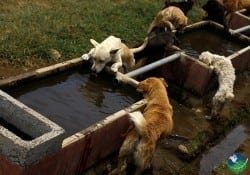 In this list of animal welfare organizations, we shouldn’t forget to mention one devoted to the welfare of pets. Zaguates is a massive dog shelter devoted to the protection, health and happiness of dogs. Although they are currently closed in order to complete a series of renovations, they will soon be needing help again in maintaining their good works. Zaguates accepts volunteers and money as well as donations in kind. A list of essential items is posted on the website and dog food is always welcome.
In this list of animal welfare organizations, we shouldn’t forget to mention one devoted to the welfare of pets. Zaguates is a massive dog shelter devoted to the protection, health and happiness of dogs. Although they are currently closed in order to complete a series of renovations, they will soon be needing help again in maintaining their good works. Zaguates accepts volunteers and money as well as donations in kind. A list of essential items is posted on the website and dog food is always welcome.
Socioeconomic Development
Underneath education, orphanages and food banks lie the issues of poverty and discrimination. While education is the foundation of a better future, lack of human rights are what is affecting these communities today. Costa Rica can be proud of its achievements especially compared to the rest of Central America, but there is still need of those organizations that attack the deeper and more complicated issues.
Seeds of Hope

 Seeds of hope is active in most of Central America but was born in Quepos, Costa Rica. In its early years, Seeds of Hope served as a shelter for those exposed to sexual exploitation. Over the years, however, they have grown into a safe haven for youngsters who live below the poverty line and have fallen victim to violence, alcohol and drug abuse. Education, counseling, and recreational activities are provided in the two club houses located in Parrita and Palomo. Read more about how to contribute!
Seeds of hope is active in most of Central America but was born in Quepos, Costa Rica. In its early years, Seeds of Hope served as a shelter for those exposed to sexual exploitation. Over the years, however, they have grown into a safe haven for youngsters who live below the poverty line and have fallen victim to violence, alcohol and drug abuse. Education, counseling, and recreational activities are provided in the two club houses located in Parrita and Palomo. Read more about how to contribute!
IWGIA: International Workgroup for Indigenous Affairs
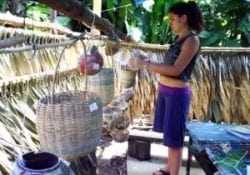
 Although not situated in Costa Rica, this global human rights organization is active in the Costa Rican communities as well as many others. Most specifically, IWGIA fights for the rights of the indigenous tribes that still populate the world. Costa Rica is home to 8 different peoples inhabiting 24 indigenous territories which amounts to 2.4 % of the Costa Rican population. Although Costa Rica voted in favor of the 2007 UN Declaration on the Rights of Indigenous Peoples, challenges including land rights and self-determination are still faced today.
Although not situated in Costa Rica, this global human rights organization is active in the Costa Rican communities as well as many others. Most specifically, IWGIA fights for the rights of the indigenous tribes that still populate the world. Costa Rica is home to 8 different peoples inhabiting 24 indigenous territories which amounts to 2.4 % of the Costa Rican population. Although Costa Rica voted in favor of the 2007 UN Declaration on the Rights of Indigenous Peoples, challenges including land rights and self-determination are still faced today.
But progress has been quite notable as well! 2014 marked the year that the University of Costa Rica started promoting the admission of indigenous students and over 400 indigenous children were studying at Costa Rica’s high school by 2017. Read more about the indigenous peoples of Costa Rica and getting involved.
Make your travels count and contribute! Leave the country a little richer than when you arrived.







Follow Us